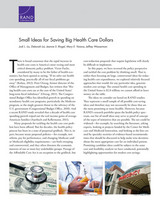
Synthesizing recent research regarding the prevention and control of adolescent smoking, this book offers the reader a convenient compendium of what is known about adolescents and tobacco use; it also highlights areas where additional research is needed. Based on their assessment of the considerable amount of information presented, the authors recommend various ways to help slow--or even reverse--the recent rise in teenage smoking. A comprehensive antitobacco program might include, for example, antismoking media campaigns based on social marketing strategies, clean indoor air laws, and the increase of cigarette prices.
Combating Teen Smoking will appeal to a broad spectrum of readers concerned about the problem of adolescent tobacco use, including policymakers who are actively seeking ways to help reduce teen smoking.
Peter D. Jacobson is Associate Professor, University of Michigan School of Public Health. Paula Lantz is Assistant Professor, University of Michigan School of Public Health. Kenneth Warner is Richard D. Remington Collegiate Professor of Public Health and Director, University of Michigan Tobacco Research Network. Jeffrey Wasserman is Consultant, the RAND Corporation and Senior Project Director, The MEDSTAT Group. Harold Pollack is Assistant Professor, University of Michigan School of Public Health. Alexis Ahlstrom is Research Associate, University of Michigan School of Public Health.

Poor health habits (drinking, smoking, lack of exercise) obviously take their toll on individuals and their families. The costs to society are less obvious but certainly more far-reaching. This investigation is the first to quantify the financial burden these detrimental habits place on American taxpayers. Willard Manning and his colleagues measure the direct costs of poor health habits (fire damage, motor vehicle accidents, legal fees), as well as collectively financed costs (medical care, employee sick leave, group health and life insurance, nursing home care, retirement pensions, liability insurance). Consider two co-workers covered by their employer's health plan: both pay the same premium, yet if one drinks heavily, the other--through their mutual insurance program--involuntarily funds the resulting health problems.
After laying out their conceptual framework, methods, and analytical approach, the authors describe precisely how and to what extent drinking, smoking, and lack of exercise are currently subsidized, and make recommendations for reducing or reallocating the expense. They present, for example, a persuasive case for raising excise taxes on alcohol. The authors correlate their data to make costs comparable, to avoid double counting, and to determine the exact costs of each of these poor health habits and some of their findings are quite surprising.
This unique study will be indispensable to public health policy specialists and researchers, as well as to health economists.

READERS
Browse our collection.
PUBLISHERS
See BiblioVault's publisher services.
STUDENT SERVICES
Files for college accessibility offices.
UChicago Accessibility Resources
home | accessibility | search | about | contact us
BiblioVault ® 2001 - 2024
The University of Chicago Press









